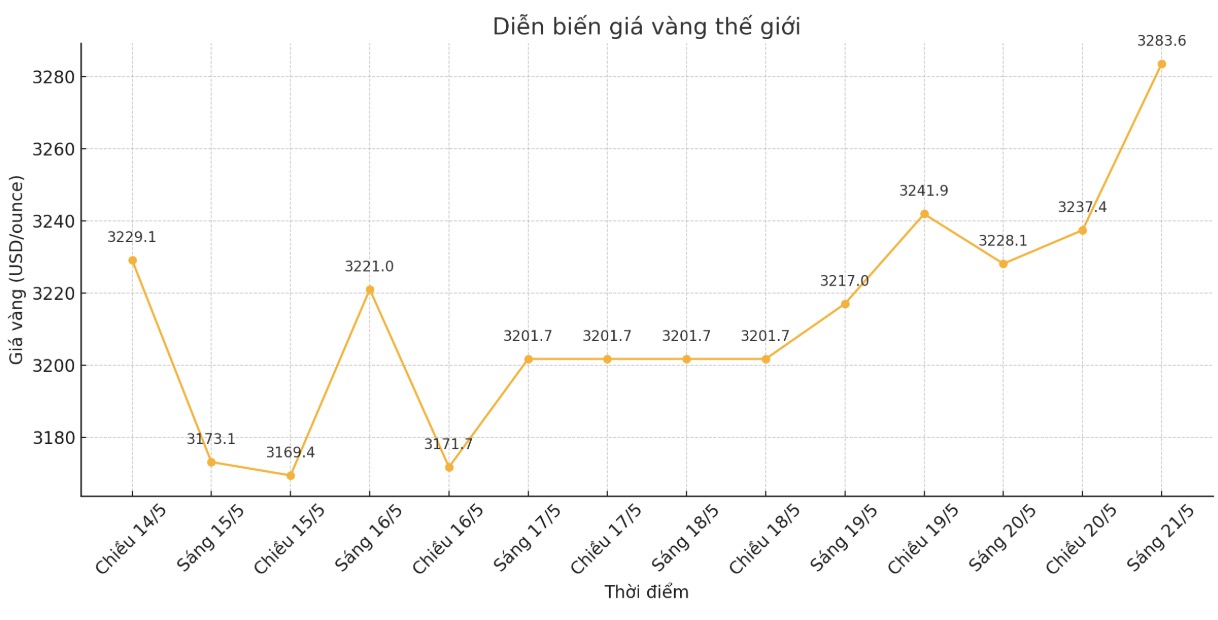In its report released on Monday, the European Central Bank (ECB) emphasized the attractiveness of gold as a safe haven asset amid increased economic fluctuations and geopolitical instability.
Unlike most bonds and stocks, gold does not generate cash flow, the report said. It is valuable based on two unique characteristics, especially during the period of high uncertainty.
First, gold is not a debt of any party, so there is no risk of default. Second, due to limited supply and relatively inflation, gold holds its intrinsic value and cannot be depreciated.
Therefore, gold is often seen as a tool to diversify investment portfolios, a hedge against inflation and devaluation of the US dollar, as well as a safe haven asset during times of financial crisis or serious geopolitical tensions.

The ECB also noted that over the past 30 years, gold has often had better performance than stocks, USD and bonds during periods of stress in the market. However, gold achieved its best results when geopolitical risks and economic policy uncertainty increased.
The report also mentioned gold's large trade flows, as a large amount of gold is transferred to warehouses in New York as gold banks prepare to deal with global tariffs imposed by President Donald Trump. It was not clear whether gold and silver were subject to tax at first, but the precious metal was eventually exempted from tax.
However, this flow has caused disruption in the European market when the price of gold futures increased more strongly than the price of spot gold in London.
This has caused the cost of borrowing and finding gold in the London market to increase. Sudden stress and disruption in the purchase, sale, transportation and delivery of physical gold in derivatives contracts raises questions about whether the parties that are required to hand over physical gold can be under pressure to call for deposits and suffer losses, the report stated.

The ECB believes that high gold prices have a negative impact on European financial stability. If extreme events occur, the gold market could have a negative impact on financial stability.
The commodity market has many weaknesses, such as focusing on a few large companies, using financial leverage, and low transparency due to OTC trading. In addition, disruptions in the physical gold market could increase the risk of price suppression, the report warned.
However, many fund experts and market analysts believe that the risks from gold are overrated.
Mr. Axel Merk - Chairman and Investment Director of Merk Investments - commented to Kitco News that although gold prices have fluctuated more strongly in recent months, the market has still operated well and liquidity is still stable.
Compared to interest rate derivatives, the leverage in the gold market is much lower; the risks are also well understood by regulators and the market. Exchanges often increase deposit requirements as fluctuations increase.
Recent events show that the market is operating well. The volatility is reasonable because investors assess the outcome as different. Leverage is also reduced. Currently, hedge funds seem to be reusing leverage. That is not necessarily cautious, but that does not mean that the financial system is at risk because of that. That is how the market works, Mr. Merk said.
Mr. Ole Hansen - Head of Commodity Strategy at Saxo Bank said that risks in the gold market are not new. Because gold is a commodity with limited supply, sudden fluctuations in supply and demand can put pressure on the market, but that does not lose the value of gold as a valuable asset.
Despite the risks, some experts say the ECB's report mainly highlights the increasingly important role of gold in finance.
Mr. Ronald-Peter Stöferle - Fund Manager at Incrementum AG - said that gold is gradually returning to the position of a chinh thuc currency, not because of regulations but because of actual demand.
As government-issued paper money is less reliable, gold becomes a solid support. The new ECB statements show that central banks are also starting to look for protection against the risks from the financial system they have created.











